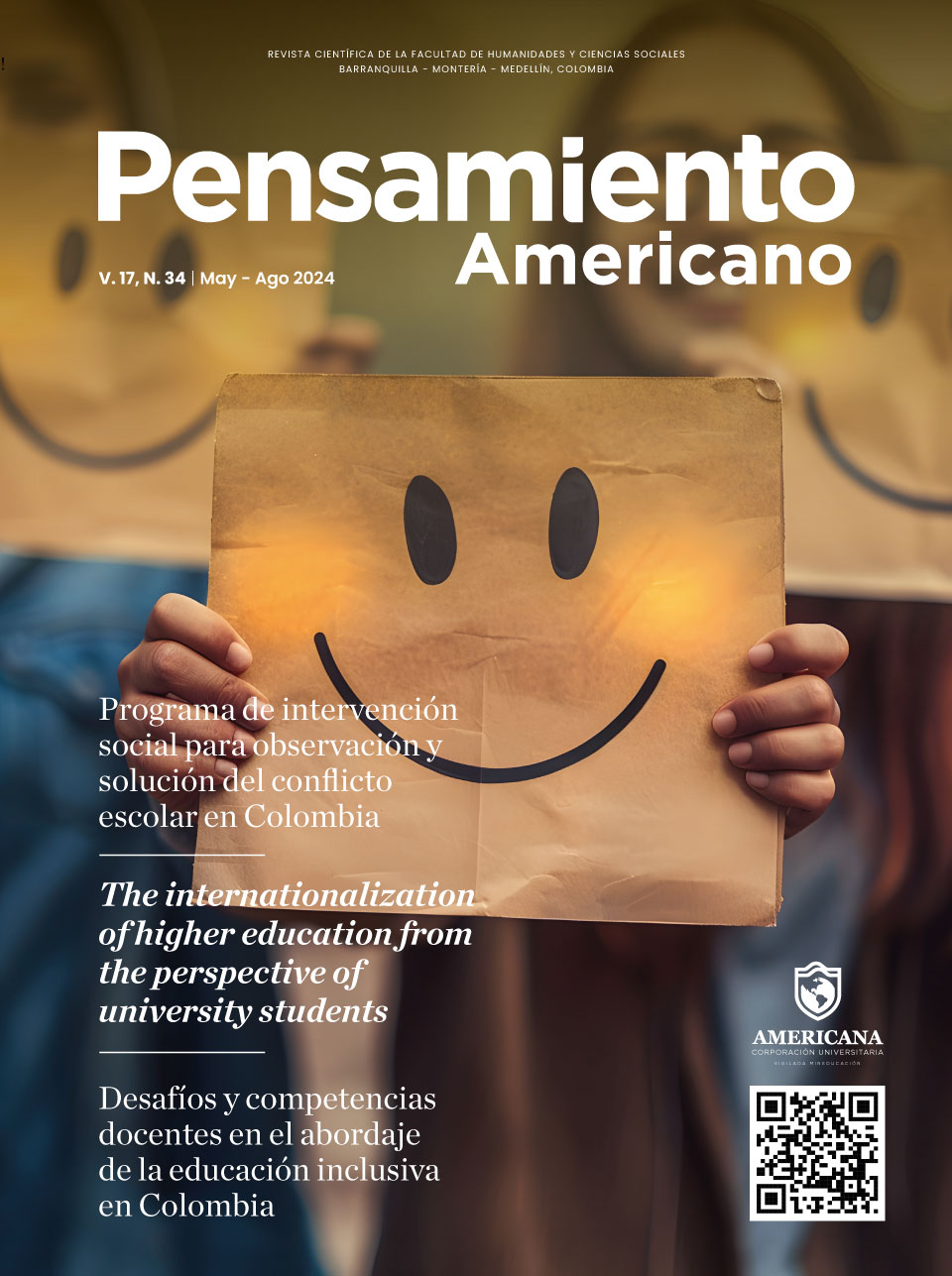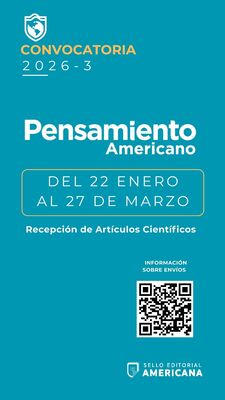Comparative Analysis of Social Skills in a Rural and Urban Context in Colombia
DOI:
https://doi.org/10.21803/penamer.17.34.730Keywords:
social skills, Teenagers, Rural AreasAbstract
Introduction: The following article aims to compare social skills in 6th-grade students from two schools, one located in the rural area and another in the urban area of Santander, Colombia, in order to identify the impact of the context on the development of social competencies; Objective: To compare social skills within institutions in two rural and urban contexts in the Santander region; Methodology: The method employed was quantitative with a comparative design. The instruments used were a sociodemographic questionnaire and the Socialization Battery BAS-3, which allows profiling social behavior based on five dimensions (social anxiety/shyness, leadership, sincerity, consideration for others, self-control in social relations, social withdrawal). The sample consisted of a total of 93 participants from two educational institutions, one located in Mesa de los Santos (Rural) and the other in Bucaramanga (Urban). Results: Significant differences were found in the dimensions of self-control, consideration for others, and social withdrawal. Students from the rural school showed greater empathy and understanding of others' needs, as well as better self-regulation and less social withdrawal. Conclusions: It is concluded that there are significant differences in some social skills between the two schools, highlighting the need to enhance the development of these competencies in the urban educational context. Further exploration is required to understand which factors in the contexts affect the development of these skills.
Downloads
References
Betoré, C., y Quílez, A. (2021). Diferencias en el rendimiento académico, metodologías y habilidades sociales en el alumnado de escuela urbana y escuela rural. [Tesis de maestria , Universidad de Zaragoza].https://zaguan.unizar.es/record/108845
Caballero, S. V., Contini de González, N., Lacunza, A. B., Mejail, S., y Coronel, P. (2018). Habilidades sociales, comportamiento agresivo y contexto socioeconómico. Un estudio comparativo con adolescentes de Tucumán (Argentina). Cuadernos de la Facultad de Humanidades y Ciencias Sociales - Universidad Nacional de Jujuy, (53), 183-203.
Cruz, L. Forero, N & Buitrago, V. (2018). Redes sociales y relaciones de pareja: una aproximación al vínculo desde la interacción cotidiana. [Trabajo de grado, Universidad Santo Tomás: Villavicencio – Colombia].https://repository.usta.edu.co/bitstream/handle/11634/12366/2018lizethcruz.pdf
Duarte, C. Pinto, J. Rodríguez, T. (2015). Being bullied and feeling ashamed: Implications for eating psychopathology and depression in adolescent girls. Journal of adolescence. 44. pp.259-268.
Departamento Administrativo Nacional de Estadística (DANE, 2020). Panorama sociodemográfico de la juventud en Colombia. Recuperado de https://www.dane.gov.co/files/investigaciones/genero/informes/informe-panorama-sociodemografico-juventud-en-colombia.pdf
Flórez, M. y Prado, M. (2021). Habilidades sociales para la vida: empatía, relaciones interpersonales y comunicación asertiva en adolescentes escolarizados. Revista Investigium Ire: Ciencias Sociales y Humanas, XII(2), 13-26.
Flores, E. Garcia, M. Calsina, W. & Yapuchura, A. (2016). Las habilidades sociales y la comunicación interpersonal de los estudiantes de la Universidad Nacional del Altiplano- Puno. Comuni@ cción. 7(2). pp. 05-14.
Franco, J., Segura, Y., y Taborda, L. (2021). Diseños curriculares e inteligencia social en zonas urbanas y rurales de Colombia. Cultura, educación y sociedad, 12(1), 255-274.
Gil, S., y Llinás, A. (2020). Grandes herramientas para pequeños guerreros. Habilidades sociales. 4, Barcelona: Editorial Flamboyant.
Gil, B. (2022). Los efectos de la crisis sanitaria del Covid-19 en la educación rural de Colombia. Panorama. 16(30). pp. 1-21 https://doi.org/10.15765/pnrm.v16i30.3023
Jurado, J. (2004). Socialización familiar y urbana en Medellín. Problemas y tendencias contemporáneos. Subjetividades e identidades. 25(8)125-144. https://repositorio.unal.edu.co/handle/unal/49439.
López, L. (2019). Pobreza y subdesarrollo rural en Colombia. Análisis desde la Teoría del Sesgo Urbano. Estudios Políticos (Universidad de Antioquia), (54), 59-81.artículo. doi.org/10.17533/udea.espo.n54a04
Lotero Franco, J. C., Restrepo Segura, Y. C., & Arroyave Taborda, L. M. (2020). Diseños curriculares e inteligencia social en zonas urbanas y rurales de Colombia. Cultura Educación y Sociedad, 12(1), 255-274.
Martínez,I, Hidalgo, S. & Sospedra-Baeza, M. (2022) - Silva, F., & Pallás, M.(1998). Batería de Socialización (Autoevaluación)(BAS-3). Tea. Estudio de la relación entre el rendimiento académico y los factores de socialización de niños de 6º de educación primaria. In VIII Congreso Internacional en Contextos Psicológicos, Educativos Y De La Salud. Departamento de Magisterio de Educación Primaria.
Medellín, Y. I., y Arroyo, I. O. (2022). Desarrollo y promoción de habilidades sociales en estudiantes del contexto rural cordobés. Revista Electrónica Entrevista Académica (REEA), 4(10), 184-196.
Merrell, K., & Gimpel, G. (2014). Social skills of children and adolescents: Conceptualization, assessment, treatment. New York, Estados Unidos: Psychology Press.
Mera, M. Martínez, G. & Bilbao, M. (2021). Adolescentes chilenos ante la inmigración latinoamericana: perfiles aculturativos, prejuicio, autoeficacia cultural y bienestar. Revista de Psicología(PUCP).39(2).849-880.
Moscovich, A. (2023). Fast calculation of p-values for one-sided Kolmogorov-Smirnov type statistics. Computational Statistics & Data Analysis, 185, 107769.
Patricio, M., Maia, F., & Bezerra, C. (2015). Las habilidades sociales y el comportamiento infractor en la adolescencia. Subjetividad y Procesos Cognitivos, 19(2), 17-38.
Robayo Escobar, E. P. (2019). Tipologías de hogar en Colombia (2000-2015): características sociodemográficas de las mujeres [Doctorado, Universidad Externado de Colombia, 2019].https://bdigital.uexternado.edu.co/entities/publication/9d690686-57f5-4e0a-bd50-1fe25e381f71
Salazar, J. A. A., Portillo, J. G., & Sandoval, D. A. C. (2019). Relación entre habilidades para la vida y riesgos vitales en adolescentes escolarizados de la ciudad de Armenia. Psicogente, 22(42), 1-23.
Salazar, J. Vergara, M., Castrillón, K. & Monsalve, L. (2020). Relación entre conflictos de la adolescencia y habilidades sociales en adolescentes de una Institución Educativa de Risaralda. Pensamiento Americano, 13(25), 52-61.
Tacca, D. R., Cuarez, R., & Quispe, R. (2020). Habilidades Sociales, Autoconcepto y Autoestima en Adolescentes Peruanos de Educación Secundaria. International Journal of Sociology of Education, 9(3), 293-324.
Valencia, B. J., & Atehortúa, N. G. (2019). Las habilidades sociales en los ambientes escolares. Revista Universidad Católica Luis Amigó (histórico), (3), 151-162.
Valverde, A., & del Socorro, M. (2023). Revista del Centro de Investigación de la Universidad La Salle Vol. 15, No. 59, Enero-Junio, 2023: 239-256. Revista del Centro de Investigación de la Universidad La Salle, 15(59), 239-256.
Torres, E. (2021). Habilidades sociales y la comunicación interpersonal en los estudiantes de Básica Superior de la Unidad Educativa “José Joaquín Olmedo” del cantón Ambato durante el covid-19 [Trabajo de grado, Universidad técnica de Ambato]
Downloads
Published
Versions
- 2024-09-09 (2)
- 2024-08-12 (1)
Issue
Section
License
Copyright (c) 2024 Pensamiento Americano

This work is licensed under a Creative Commons Attribution-NonCommercial-NoDerivatives 4.0 International License.
The author or authors of an article accepted for publication in the Journal Pensamiento Americano will transfer all of the patrimonial rights to the American University Corporation free of charge, within which are included: the right to edit, publish, reproduce and distribute both print media as digital, in addition to include in article in international indexes and / or databases, likewise, the Editorial Seal is authorized to use the images, tables and / or any graphic material presented in the article for the design of covers or posters from the same magazine. By assuming the patrimonial rights of the article, it may not be partially or totally reproduced in any printed or digital media without its express permission.
AUTHORITY ASPECTS
For the Pensamiento Americano Journal, all the authors of an article have made substantial contributions to the research and the manuscript, and they share the responsibility when the article presents errors, fraud in some way or violations of copyright.
After submitting an article, the journal does not accept the addition, deletion or change in the order of the authors, in addition we reserve the right to release the article when it has been submitted to the journal and under no circumstances will American Thought accept the article. withdrawal of an article during any phase of the editorial process





